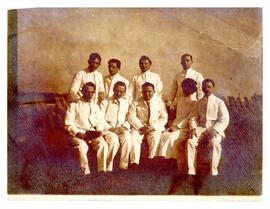The papers found in this collection are overwhelmingly of a professional nature: notebooks, notes, papers, reprints. Still, it is possible in reviewing these files to get some insights into Dr. Rubin as a person. The records that serve best to do this are the letters written to him over the years (Box 1) and the photographs that came as a part of this collection. Also, interspersed with his notes (see, for instance Box 3, f.2), are sheets of paper filled with "jottings", lists of trite phrases that seemed to have some relationship, one to the next. In the file of his own writings (Box 1, f.8), further aspects of him can be seen in a note on ancestral worship, and a letter to his wife in 1921. Also of note here is a file compiled in 1935 during a failed attempt to secure Dr. Rubin a Nobel Prize for his development of the Rubin Test. (See Box 2, f.5)
The professional material contains notes and raw data, as well as papers in progress and his collected works. The notebooks include those from his medical school days at Columbia Physicians and Surgeons in 1904 and 1905, as well as notes taken while studying in Vienna. Some of the latter were written in German. The notebooks are arranged chronologically.
The Papers/Reprints files are arranged alphabetically by subject or title, depending on how Rubin labeled the folders. These papers are mostly all undated. The files many times contain long notes on the topic and show Rubin's thoughts and questions he wanted to solve. If no paper was included in the file with the notes, they were simply labeled "Notes" and filed under that heading.
Other items of particular interest or value in this collection include the typed copies of articles relating to fibroid tumors, dating from 1878-1932. (Box 1, f.3) There is a long note about a visit he made to Austria in the early 1920's where he discusses the changes brought by the First World War. (Box 1, f.8) Finally, there are operative assignments from 1911, listing which operations Dr. Rubin performed on a given day and his notes about the case. On these, and throughout the collection, there are many drawings to illustrate pathology or technique. Any patient information here is restricted according to the law and the policies of the Archives.
One of the more interesting parts of this collection is the photographs that accompany it. They date from 1907-1958, mostly black and white. Of special note are a series of snapshots from the Rubins' trip to Greece in June, 1952 to receive an honorary degree from the University of Athens. There is also a photograph of Dr. Rubin's private examining room in 1911. Dr. Hiram Vineberg is pictured in Mount Sinai's clinical amphitheatre in 1907, supervising an operation without surgical masks. There are also many photos of unidentified babies, usually with an inscription of thanks to Dr. Rubin.
Many of the photographs are oversize. These can be found in Box 7. The photographs of events, many in rolls, are stored in Box 6. Memorabilia, a Jacobi Medallion and two souvenir money clips, have been placed in Box 5.






